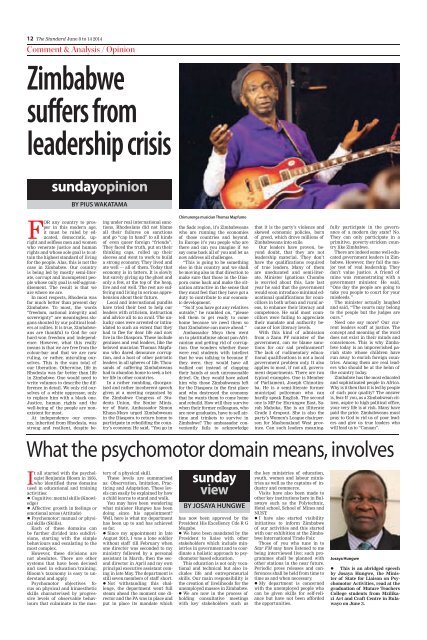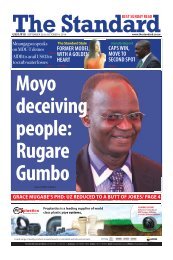You also want an ePaper? Increase the reach of your titles
YUMPU automatically turns print PDFs into web optimized ePapers that Google loves.
12 <strong>The</strong> <strong>Standard</strong> <strong>June</strong> 8 to 14 <strong>2014</strong><br />
Comment & Analysis / Opinion<br />
Zimbabwe<br />
suffers from<br />
leadership crisis<br />
sundayopinion<br />
BY PIUS WAKATAMA<br />
For any country to prosper<br />
in this modern age,<br />
it must be ruled by educated,<br />
democratic, upright<br />
and selfless men and women<br />
who venerate justice and human<br />
rights and whose sole goal is to attain<br />
the highest standard of living<br />
for the people. Alas, this is not the<br />
case in Zimbabwe. our country<br />
is being led by mostly semi-literate,<br />
corrupt and incompetent people<br />
whose only goal is self-aggrandisement.<br />
<strong>The</strong> result is that we<br />
are where we are.<br />
In most respects, rhodesia was<br />
far much better than present day<br />
Zimbabwe. To most, the words<br />
“freedom, national integrity and<br />
sovereignty” are meaningless slogans<br />
shouted by our political leaders<br />
at rallies. It is true, Zimbabweans<br />
are thankful to God for our<br />
hard-won freedom and independence.<br />
However, what this really<br />
means is that we are free from the<br />
colour-bar and that we are now<br />
ruling, or rather, misruling ourselves.<br />
This is the sum total of<br />
our liberation. otherwise, life in<br />
rhodesia was far better than life<br />
in Zimbabwe. one would need to<br />
write volumes to describe the difference<br />
in detail. We only rid ourselves<br />
of a white oppressor, only<br />
to replace him with a black one.<br />
Justice, human rights and the<br />
well-being of the people are nonexistent<br />
for most.<br />
At independence our economy,<br />
inherited from rhodesia, was<br />
strong and resilient, despite being<br />
under real international sanctions.<br />
rhodesians did not blame<br />
all their failures on sanctions<br />
and go “cap in hand” to all kinds<br />
of even queer foreign “friends”.<br />
<strong>The</strong>y faced the truth, put on their<br />
thinking caps, rolled up their<br />
sleeves and went to work to build<br />
a strong economy. <strong>The</strong>y lived and<br />
ate well — all of them. Today that<br />
economy is in tatters. It is slowly<br />
but surely giving up the ghost and<br />
only a few, at the top of the heap,<br />
live and eat well. <strong>The</strong> rest are suffering<br />
and living in serious apprehension<br />
about their future.<br />
Local and international pundits<br />
have tried their best to help our<br />
leaders with criticism, instruction<br />
and advice all to no avail. <strong>The</strong> unlucky<br />
ones were arrested or intimidated<br />
to such an extent that they<br />
had to flee for dear life and now<br />
live in the Diaspora. <strong>The</strong>se include<br />
geniuses and real leaders, like the<br />
beloved musician Thomas Mapfumo<br />
who dared denounce corruption,<br />
and a host of other patriotic<br />
leaders in all spheres of life. Thousands<br />
of suffering Zimbabweans<br />
had to abandon home to seek a better<br />
life in other countries.<br />
In a rather rambling, disorganised<br />
and rather incoherent speech<br />
given at a meeting organised by<br />
the Zimbabwe Congress of Students<br />
Union, the Senior Minister<br />
of State, Ambassador Simon<br />
Khaya-Moyo urged Zimbabweans<br />
in the Diaspora to return home to<br />
participate in rebuilding the country’s<br />
economy. He said, “You go in<br />
Chimurenga musician Thomas Mapfumo<br />
the Sadc region, it’s Zimbabweans<br />
who are running the economies<br />
of those countries and beyond.<br />
In Europe it’s you people who are<br />
there and can you imagine if we<br />
say come back all of you and let us<br />
now address all challenges.<br />
“This is going to be something<br />
else in this country and we shall<br />
be moving also in that direction to<br />
make sure that those in the Diaspora<br />
come back and make the situation<br />
attractive in the sense that<br />
they must feel that they have got a<br />
duty to contribute to our economic<br />
development.<br />
“So if you have got any relatives<br />
outside,” he rambled on, “please<br />
tell them to get ready to come<br />
home because we need them so<br />
that Zimbabwe can move ahead.”<br />
Ambassador Moyo then went<br />
on to platitudinise about pan-Africanism<br />
and getting rid of corruption.<br />
one wonders whether those<br />
were real students with intellect<br />
that he was talking to because if<br />
they were, they would have all<br />
walked out instead of clapping<br />
their hands at such unreasonable<br />
drivel. or, they would have asked<br />
him why those Zimbabweans left<br />
for the Diaspora in the first place<br />
and who destroyed the economy<br />
that he wants them to come home<br />
and rebuild. How will they survive<br />
when their former colleagues, who<br />
are now graduates, have to sell airtime<br />
and trinkets to survive in<br />
Zimbabwe? <strong>The</strong> ambassador conveniently<br />
fails to acknowledge<br />
that it is the party’s violence and<br />
skewed economic policies, born<br />
of greed, which drove millions of<br />
Zimbabweans into exile.<br />
our leaders have proven, beyond<br />
doubt, that they are not<br />
leadership material. <strong>The</strong>y don’t<br />
have the qualifications required<br />
of true leaders. Many of them<br />
are uneducated and semi-literate.<br />
Minister Ignatious Chombo<br />
is worried about this. Late last<br />
year he said that the government<br />
would soon introduce minimal educational<br />
qualifications for councillors<br />
in both urban and rural areas,<br />
to enhance their literacy and<br />
competence. He said most councillors<br />
were failing to appreciate<br />
their mandate and authority because<br />
of low literacy levels.<br />
With this kind of admission<br />
from a Zanu PF minister of the<br />
government, can we blame sanctions<br />
for our sad predicament?<br />
<strong>The</strong> lack of rudimentary educational<br />
qualifications is not a local<br />
government problem only. It also<br />
applies to most, if not all, government<br />
departments. <strong>The</strong>re are two<br />
typical examples. one is Member<br />
of Parliament, Joseph Chinotimba.<br />
He is a semi-literate former<br />
municipal policeman who can<br />
hardly speak English. <strong>The</strong> second<br />
one is MP for Hurungwe East, Sarah<br />
Mahoka. She is an illiterate<br />
Grade 2 dropout. She is also the<br />
party’s Women’s League chairperson<br />
for Mashonaland West province.<br />
Can such leaders meaningfully<br />
participate in the governance<br />
of a modern day state? No.<br />
<strong>The</strong>y can only participate in a<br />
primitive, poverty-stricken country<br />
like Zimbabwe.<br />
<strong>The</strong>re are indeed some well-educated<br />
government leaders in Zimbabwe.<br />
However, they fail the major<br />
test of real leadership. <strong>The</strong>y<br />
don’t value justice. A friend of<br />
mine was remonstrating with a<br />
government minister. He said,<br />
“one day the people are going to<br />
take you people to court for your<br />
misdeeds.”<br />
<strong>The</strong> minister actually laughed<br />
and said, “<strong>The</strong> courts may belong<br />
to the people but the judges are<br />
ours.”<br />
Need one say more? our current<br />
leaders scoff at justice. <strong>The</strong><br />
concept and meaning of the word<br />
does not exist in their minds and<br />
consciences. This is why Zimbabwe<br />
today is an impoverished pariah<br />
state whose children have<br />
run away to enrich foreign countries.<br />
Among them are real leaders<br />
who should be at the helm of<br />
the country today.<br />
Zimbabwe has the most educated<br />
and sophisticated people in Africa.<br />
Why is it then that it is led by people<br />
of such poor quality? <strong>The</strong> answer<br />
is, fear. If you, as a Zimbabwean citizen,<br />
aspire to high political office,<br />
your very life is at risk. Many have<br />
paid the price. Zimbabweans must<br />
pray to God to rid us of poor leaders<br />
and give us true leaders who<br />
will lead us to “Canaan”.<br />
What the psychomotor domain means, involves<br />
It all started with the psychologist<br />
Benjamin Bloom in 1956,<br />
who identified three domains<br />
used in educational and training<br />
activities:<br />
• Cognitive: mental skills (Knowledge)<br />
• Affective: growth in feelings or<br />
emotional areas (Attitude)<br />
• Psychomotor: manual or physical<br />
skills (Skills).<br />
Each of these domains can<br />
be further divided into subdivisions,<br />
starting with the simple<br />
behaviours and escalating to the<br />
most complex.<br />
However, these divisions are<br />
not absolutes. <strong>The</strong>re are other<br />
systems that have been devised<br />
and used in education/training.<br />
Bloom’s taxonomy is easy to understand<br />
and apply.<br />
Psychomotor objectives focus<br />
on physical and kinaesthetic<br />
skills characterised by progressive<br />
levels of observable behaviours<br />
that culminate in the mastery<br />
of a physical skill.<br />
<strong>The</strong>se levels are summarised<br />
as: observation, Imitation, Practicing<br />
and Adaptation. <strong>The</strong>se levels<br />
can easily be explained by how<br />
a child learns to stand and walk.<br />
You may have been wondering<br />
what minister Hungwe has been<br />
doing since his appointment?<br />
Well, here is what my department<br />
has been up to and has achieved<br />
so far.<br />
• Since my appointment in late<br />
August 2013, I was a lone soldier<br />
without staff till February when<br />
one director was seconded to my<br />
ministry followed by a personal<br />
assistant in March, then the second<br />
director in April and my own<br />
principal executive assistant coming<br />
in late May. <strong>The</strong> department is<br />
still seven members of staff short.<br />
• Not withstanding this challenge,<br />
the department went full<br />
steam ahead the moment one director<br />
and the PA was in place and<br />
put in place its mandate which<br />
sunday<br />
view<br />
BY JOSAYA HUNGWE<br />
has now been approved by the<br />
President His Excellency Cde r G<br />
Mugabe.<br />
• We have been mandated by the<br />
President to liaise with other<br />
stakeholders which include ministries<br />
in government and to coordinate<br />
a holistic approach to psychomotor<br />
based education.<br />
This education is not only vocational<br />
and technical but also includes<br />
life and entrepreneurial<br />
skills. our main responsibility is<br />
the creation of livelihoods for the<br />
unemployed masses in Zimbabwe.<br />
• We are now in the process of<br />
holding consultative meetings<br />
with key stakeholders such as<br />
the key ministries of education,<br />
youth, women and labour ministries<br />
as well as the captains of industry<br />
and commerce.<br />
Visits have also been made to<br />
other key institutions here in Bulawayo<br />
such as the Polytechnic,<br />
Hotel school, School of Mines and<br />
NUST.<br />
• I have also started visibility<br />
initiatives to inform Zimbabwe<br />
of our activities and this started<br />
with our exhibition at the Zimbabwe<br />
International Trade Fair.<br />
Those of you who tune in to<br />
Star FM may have listened to me<br />
being interviewed live; such programmes<br />
shall be planned with<br />
other stations in the near future.<br />
Periodic press releases and conferences<br />
shall be held from time to<br />
time as and when necessary.<br />
• My department is concerned<br />
with the unemployed people who<br />
can be given skills for self-reliance<br />
but have not been afforded<br />
the opportunities.<br />
Josaya Hungwe<br />
• This is an abridged speech<br />
by Josaya Hungwe, the Minister<br />
of State for Liaison on Psychomotor<br />
Activities, read at the<br />
graduation of Mutare Teachers<br />
College students from Mzilikazi<br />
Art and Craft Centre in Bulawayo<br />
on <strong>June</strong> 3.


















